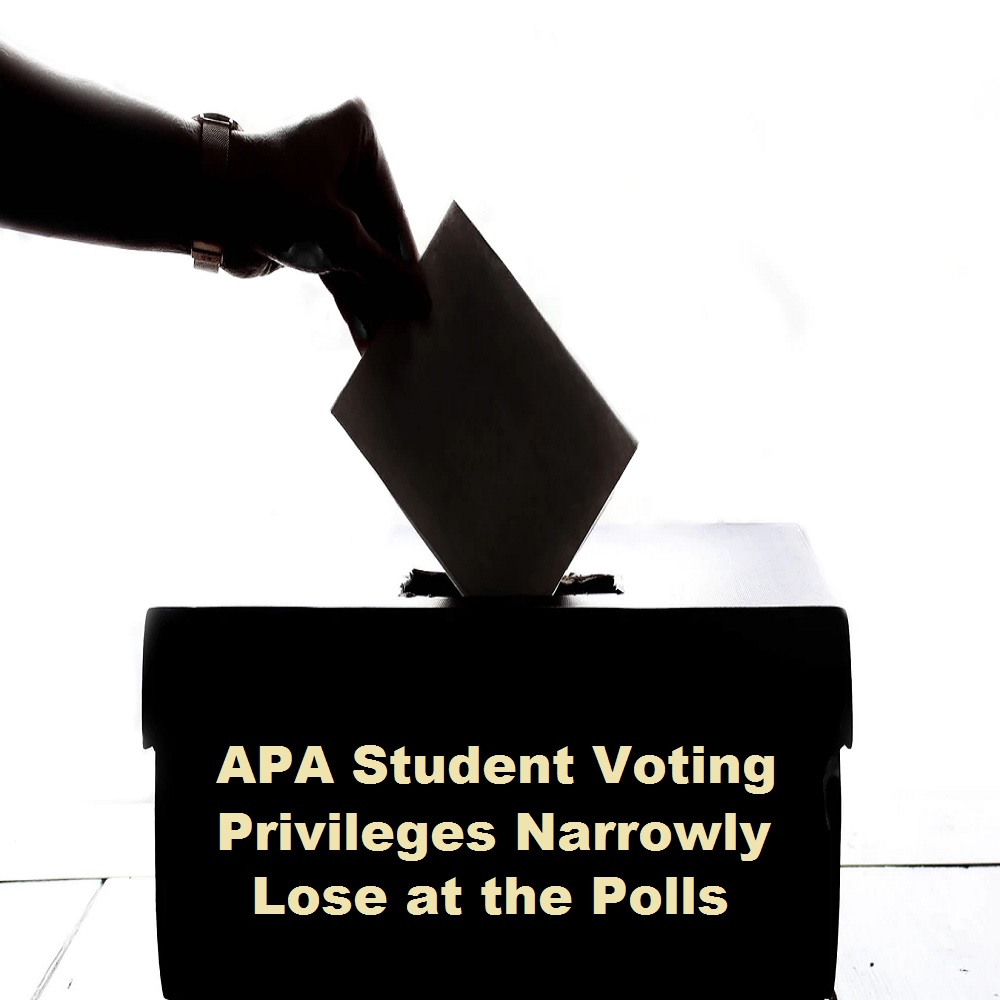2023 is a huge year for graduate students in APA! For the first time, Graduate students that have been APA members for at least one year can vote for the 2023 APA President-Elect, APA Board of Director’s Members-at-Large, Apportionment Ballots, and Bylaw amendments since being enfranchised in Fall 2020.
To help graduate students learn more about the candidates and their stances on issues at the forefront of graduate student members, the members of the APAGS Elections Work Group have asked candidates to submit their responses to the following three questions:
- As APA President, what do you envision graduate students’ roles being in APA’s response to ongoing threats to human rights amidst changing societal circumstances (e.g., affirmative action, removal of EDI courses)?
- Given research data suggesting financial burden is a significant burden for graduate students, as APA President, what would be your role in responding to the growing student debt crisis?
- With increased graduate student representation across APA, as APA President, how would you foster leadership development for graduate student members in leadership?
As a committee, APAGS thanks all candidates for their responses and commitment to graduate students! Please note we have organized candidates in alphabetical order based on their last names. You can also view all candidate statements here.
As APA President, what do you envision graduate students’ roles being in APA’s response to ongoing threats to human rights amidst changing societal circumstances (e.g., affirmative action, removal of EDI courses)?
Eric Butter
Central. Graduate students are central to our work on protecting and expanding human rights.
Our graduate students are our most credible spokespeople and advocates for responding to the multitude of threats to human rights. APA’s graduate students are more diverse, more globally represented and connected, and more cohesive in their perspective on human rights than any other generation of career status within the Association. Additionally, APA’s graduate students have a responsibility to our future that underscores their standing when addressing human rights.
We should not ask graduate students to stand alone however. We must invite graduate students to co-design our responses to each threat to human rights we encounter and even the ones we can anticipate encountering. These co-designs should be on-going, planned, and ready to execute. We need to respond, not react, to these threats with a verve reflective of the urgency of our next generation of psychologists and the deliberateness of a collaborative, action-oriented response developed in concert with APA staff and all relevant governance groups.
With graduate students centered in this work, we have the opportunity to not only engage our most motivated and impacted stakeholders, but also our most informed by emerging frameworks, models, and research.
Debra Kawahara
With the ongoing threats to human rights amidst changing societal circumstances, I believe that graduate students can be active participants in APA’s response to critical social issues. The direct impact of these issues on graduate students’ lives, physically, emotionally, and mentally, as well as on their education and training, is real. Many may feel invalidated, threatened, and disenfranchised by the current threats, and I have seen firsthand how graduate students can effectively advocate, protest, and be activists. As APA President, I would like to harness this energy and dedication by forming an advisory/consultative group of graduate student members to provide me with the information about how best to give voice and empower graduate students to act. I would seek a diverse group in terms of an intersectionality of identities, specialties, and stage in their graduate studies. I will listen to what graduate student members believe is the best way to mobilize their efforts in promoting change and advancing human rights in APA and beyond and then work collaboratively with the graduate student members to put this into action.
Margaret Kovera
The recent Supreme Court decisions eliminating considerations of race in college admissions just made diversifying higher education much harder. And the attacks on LGBTQIA+ people and DEI material in Florida classrooms is appalling. But as psychologists, we have the tools to fight these trends and I include graduate students in that “we.” As psychologists, we have the expertise to develop new ways of evaluating admissions materials that will allow us to identify a diverse student body that is prepared for graduate study. We must continue to find new avenues for disseminating our science supporting human rights in this very polarized political environment. With attacks on gender-affirming care, DEI initiatives, and reproductive care, we need to make our science known. As inaugural chair of the Amicus Chair Expert Panel, I have been working to involve students in doing environmental scans of our state and district appellate courts for cases that can be informed by our science. We recently submitted a brief in Colorado in an attempt to protect minors from conversion therapies and are actively seeking a case in which we can weigh in with our science supporting access to reproductive health care. We need help with this environmental scanning, and whether I win this election or not, I would welcome APAGS members to contact me if they wish to play a role in our judicial advocacy efforts.
Grant Rich
Graduate students are the future of psychology. They must be involved, and psychology must be more than merely an intellectual exercise. Our specialized research and journals are valuable, but psychologists must resist siloes and communicate and advocate for positive social change. Such work means utilizing research to challenge threats to affirmative action and DEI courses. This also means communicating with policymakers and the general public. Psychology graduate students are more diverse than a generation ago, in terms of gender, race/ethnicity, religion, national origin, LGBTQAI2S+ status, disability, and age. Involving our diverse body of graduate students in meaningful ways, such as participation as full, voting members of committees and workgroups will be positive steps towards effective advocacy, and for building our leaders for the future. Graduate students who have recently benefitted from affirmative action, DEI courses, and LGBTQAI2S+ materials in high schools/colleges also provide essential points of view to share with psychology leaders of today, policymakers, and other groups involved with the decision-making. I am optimistic, that working collaboratively with graduate students, APA divisional and national leaders, psychology and society can move forward through these challenging societal circumstances.
I also advocate for more divisional student listservs and social media outreach.
Given research data suggesting financial burden is a significant burden for graduate students, as APA President, what would be your role in responding to the growing student debt crisis?
Eric Butter
Free. Graduate training in psychology should be free.
While we must continue to advocate for loan forgiveness programs, we must also explore new strategies to mitigate the financial burden of graduate training in psychology to begin with. Loan forgiveness is only addressing the challenge after debt has been accrued. I have heard no conversation about alternative funding models for graduate education in psychology.
Private, for profit graduate school tuition is crushing. It hobbles a career and a life before it starts. There are too few public university, tuition wavier programs available and too few slots in those programs. Our nation’s greatest public universities have abandoned scientist-practitioner and practitioner-scholar programs for clinical science programs with highly selective admissions. We have allowed our institutions of higher education to ignore their duty to the public good.
APA can help our country imagine something different. With the mental health crisis gripping our nation, public funding for professional training in psychology is a compelling issue. With a combination of direct funding to graduate schools and expansion of service learning programs where national and community service could earn tuition waivers, free graduate school is not a delusion. We should aim high and be bold.
Debra Kawahara
Student loan debt is a serious issue for many individuals who pursue higher education, and President Biden has been proactively seeking to address this issue through student debt forgiveness. However, this action does not address the future. As APA President, there will be several actions that I will facilitate. First, there are congressional representatives who are proposing the elimination of federal work study. APA, along with other professional organizations, should immediately advocate against this action as it would significantly hurt students who rely on these monies as they matriculate through their graduate studies. Also, APA can continue efforts in advocating and soliciting for more funding and scholarships for graduate psychology students from both public and private entities such as philanthropic foundations, healthcare organizations, and public and private organizations or corporations. Another possible idea is for APA to advocate for a program that provides tuition support for students instead of students signing educational loans. In return for the tuition, students could agree to work in areas that are in high need of psychological services or with populations that are underserved. Working with APAGS, the APA Advocacy Office, and the APA directorates and offices will be critical in moving these actions forward.
Margaret Kovera
In the past, I have participated in APA advocacy on the Hill to increase loan forgiveness funding and would continue and expand on those activities if elected President. Unfortunately, there is only so much APA can do to set costs and funding opportunities at universities, but APA could be proactive in providing educational materials for graduate students that address financial literacy, including the tax implications of fellowships, small grants, as well as costs of attendance (e.g., conference travel), so that students have the requisite knowledge to make difficult financial decisions.
Grant Rich
In my view, step one is for psychology faculty and administrators and APA divisional and national leaders to be better informed about the changes in student expenses in higher education, such as tuition and fees, and the student debt crisis. Some psychology faculty may assume that the challenges are similar to what was present a generation ago. The reality is clear; evidence shows dramatic and disproportionate increases in expenses for students recently, far outpacing general inflation and cost of living increases in broader society.
I firmly believe higher education institutions must clearly and transparently communicate costs and fees to students and must be clear as to post-graduation realities. Colleges and universities must annually conduct surveys to assess information about average student starting salaries and pay trajectories for students and alumni in psychology, and facts about student placements (such as in academe, or outside of academe, and visiting vs. tenure track positions).
I will advocate for national APA level committees and workgroups on this topic, and will advocate for student representation on these groups; I believe representation from multiple, diverse graduate students will be most beneficial as student experiences vary widely. APA can disseminate results from such fact-finding inquires.
With increased graduate student representation across APA, as APA President, how would you foster leadership development for graduate student members in leadership?
Eric Butter
Coaching. Coaching is underutilized for our graduate students.
For graduate student leadership development, we need to support a learning culture across APA governance that goes beyond mentorship. Mentorship is important and it happens. Student leaders gravitate toward dynamic, more senior leaders who are generous with their time and resources. We have formal mentorship programs as well. Often mentors become sponsors. Many graduate students impress more experienced APA leaders as well as senior APA staff who sponsor them for future opportunities. This is important.
Yet, mentorship implies a hierarchical relationship. Typically, an “expert” and more senior professional is providing advice, guidance, answers, skills, and solutions to a more “junior” professional in training. Coaching is more deliberate, student-centered, and amplifies the student voice. Coaching can be bi-directional. The coach helps the student become the best version of themselves, while the mentor helps the student become a good version of the mentor.
As President, I would initiate a “culture of coaching”. Our graduate student leaders would have an opportunity for a confidential, coaching relationship where each student could focus on their own development as a leader, developing their own wisdom, learning from their successes and mistakes, and finding their own way in APA.
Debra Kawahara
Fostering leadership development for graduate student members is important as I believe that graduate students are the future of the field and APA. In August 2022, the Leadership Development Institute (LDI) was created, and the next steps were outlined. As APA President, I would work collaboratively with APAGS and LDI to conduct a needs assessment to identify and communicate established and future programs for leadership development of graduate student members. In addition, providing more leadership opportunities for graduate student members within APA and beyond is important as these experiences build leadership skills. These would include, but not limited to, establishing graduate student positions in the APA directorates and offices; key agencies, foundations, and funding sources such as NSF, NIH, NIMH, CDC, VA, DoD, EPA; public and private organizations; and local, state, and federal departments. The leadership opportunities will hopefully cover the wide range of specialties within our field and permeate those diverse areas with psychologists and our science and knowledge. Lastly, for all of my presidential initiatives, I will have at minimum one graduate student member on each of the initiatives to ensure that the graduate student members’ voice and presence are represented.
Margaret Kovera
I have experience creating opportunities for graduate student leadership during my previous Editorship of Law and Human Behavior (creating a student editorial board, where student reviewers were mentored by editorial board members so that they could learn the ins and outs of peer reviewing). I would include student members on task forces and other leadership groups so that they could learn through participation in leadership. When mentoring my own graduate students, I find that treating them as colleagues from the very beginning helps them grow their leadership abilities. I would hope to continue such an approach if elected.
Grant Rich
I have an abiding interest in education and student success; this is clearly demonstrated by the fact I have three co-edited books on diversifying/internationalizing the teaching of psychology, and many chapters/articles on the topic, including in American Psychologist, and am a Division 2 Fellow (Teaching). I have extensive experience- over 25 years- teaching both in brick and mortar and online formats, and have received strong positive evaluations for my teaching both in the USA and abroad. I have supervised many dissertations and theses at several institutions.
My experience tells me that we must do a better job of supporting and involving graduate students early on and through their process, and beyond to the ECP (early career professional) stage. I will work at the APA and divisional level to assess graduate student leadership opportunities and endeavor to build more and better such roles!
Providing students with adequate financial and academic support will free up time for graduate students to more actively and fully participate in research, publishing, and committee workgroup opportunities that build careers, by facilitating graduate student participation in activities where they not only work with APA and divisional and faculty leaders, but also are taking on leadership roles now!
We hope that you will find this information useful as you decide how to cast your vote. Your voice matters! Look for ballot information via email. If you do not receive a ballot, please contact Aliza Epstein.


 Armand R. Cerbone, PhD
Armand R. Cerbone, PhD Jean Lau Chin, EdD
Jean Lau Chin, EdD Steven D. Hollon, PhD
Steven D. Hollon, PhD Sandra L. Shullman, PhD
Sandra L. Shullman, PhD Susan Krauss Whitbourne, PhD
Susan Krauss Whitbourne, PhD